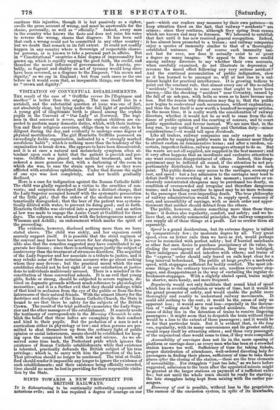VISITATION OF CONVENTUAL ESTABLISHMENTS. TICE result of the case of
" Griffiths versus De rEspinasse and another" is better than the origin. The case itself lies in a nutshell, and the substantial question at issue was one of fact, not absolutely clear, but lying under the full ight of probability. A young girl of illegitimate birth is placed among the orphan pupils in the Convent of " Our Lady " at Norwood. The regi- men in that convent is severe, and the orphan children are ex- pected to perform many domestic duties, which, with their instruc- tion and their religious exercises, oblige them to rise early, to be diligent during the day, and evidently, to undergo some degree of physical mortification. The girl Henrietta Griffiths possessed an exceedingly feeble organization, indicated by a " strongly marked scrofulous habit" ; which is nothing more than the tendency of the organization to break down. She appears to have been discontented; and it is at once a natural and melancholy symptom often at- tendant upon such a habit that the patient is peevish and per- verse. Griffiths was placed under medical treatment, and was ordered a more generous diet, with a darkening of the room in which she was, to ease the strain upon her eyes as they were afflicted with scrofulous ophthalmia. Under that disease the s' ht of one eye was lost completely, and her health gradually declined.
Here is a case for indignation against the Roman Catholic faith! The child was gladly regarded as a victim to the cruelties of con- vents; and suspicion developed itself into a distinct charge, that the Lady Superior occupied herself with the systematic persecution
of the little ; that the orders of the medical men were sys- tematically disregarded; that the beer of the patient was systema- tically diluted with water, to prevent its doing good ; and so forth. Henrietta Griffiths was elevated into a prosecutrix ; and an action at law was made to engage the Assize Court at Guildford for three days. The subpcena was adorned with the heterogeneous names of Wiseman and Achilli; an endorsement which marks the spirit of the proceeding. The evidence, however, disclosed nothing more than we have stated above. The child was sickly, and her organism could scarcely support itself. It is possible that the strict regimen of the convent may have been too severe for her strength. It is pos- sible also that the remedies suggested may have contributed to ag- gravate her disease ; since there is nothing more justly the subject of controversy than the treatment of strumous disorders. The acquittal of the Lady Superior and her associate is a tribute to justice, and it may rebuke some of those sectarian accusers who go about seeking whom they may devour; but the practical moral which the case establishes should not be lost sight of in our satisfaction atjustice done to individuals maliciously accused. There is a mischief in the constitution of these conventual schools. It is an evil that young girls, feeble or strong, should be subjected to severe regimen, de- vised on dogmatic grounds without much reference to physiological necessities; and it as a further evil that they should undergo trials of that kind in seclusion from the eye of the public or from the free intercourse of their natural friends. With the utmost liberty for the doctrines and discipline of the Roman Catholic Church, the State is bound to see that there be safety for the subjects of the British Crown. The result of the trial perfectly exonerates the Lady Supe- rior and the other managers of the establishment. It scarcely needs the testimony of correspondents in the Morning Chronicle to esta- blish the belief that these ladies are exemplary in their conduct and kind to their pupils.' But the probation of a nun is not a curriculum either in physiology or law ; and when persons are per- mitted to shut themselves up from the ordinary light of public opinion or social intercourse, means should be established for keep- ing open the connexion both with law and science. As we ob- served some time back, the Protestant pride which ignores the existence of Roman Catholic establishments while that existence is tolerated, practically defrauds the British subject of his true privilege ; which is, to carry with him the protection of the law. That privation should no longer be continued. The trial at Guild- ford should render it impossible any longer to ignore the existence of such establishments; and their existence being officially recorded, time should no more be lost in providing for their responsible visita- tion by the State.


























 Previous page
Previous page